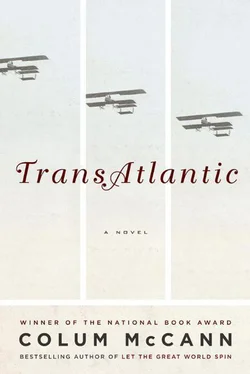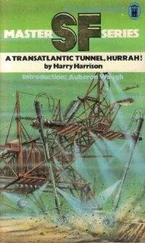WHEN EMILY WOKE hours later — in the car, in the gathering dark — she was not surprised to see her daughter asleep with her head on Ambrose’s shoulder. She looked as if she were fitting into something already made to her shape. Lottie’s hair spread across the lapel of his jacket.
Ambrose held steady to the wheel, driving as carefully as he could so as not to disturb her.
FOUR MONTHS LATER, they were married. The wedding took place in Belfast, in a Protestant church off the Antrim Road. It was September, but the day was delivered on a coattail of summer. Leaves skittered green on the trees. A flock of starlings harried the air.
Emily and Lottie arrived in a white car, the ribbons pulled taut in the breeze. They entered through the black ironwork gates. Emily stepped out carrying the hem of her daughter’s lace. For a moment she even forgot her walking cane. Only a tinge of arthritis. She crossed the shadow into the dark of the church. The pews were filled to near bursting point. Dark suits and elaborate hats. Young men in RAF uniforms. Girls in long flapper dresses. Old women with a strategic handkerchief tucked in their sleeves. Ambrose’s family owned a mill that specialized in aero-linen. Many of the employees had come along. Hard-looking men in gray suits, flat hats stuffed in their pockets. There were bouquets of flowers from Short Brothers, from Vickers, one in the shape of a Wellington glider. Emily sat in the front pew, conspicuous in her aloneness, but she didn’t care: the young vicar began the service by holding his arms high in the air, like a man about to guide a plane towards landing. Emily had not been in a church in many years. She listened closely to the service as it unfolded. She was pleased by the lilt of the northern accent.
A gauntlet was made as the couple walked down the aisle. Ambrose appeared embarrassed at the fuss. His cheeks flushed red underneath his gray top hat. Lottie wore flat heels so as not to tower over him. A rain of white confetti came down outside. The couple kissed on the steps of the church.
In the hotel afterwards, Emily was taken outside to the small garden. Ambrose’s father brought her a chair. She sat in a square of sunshine, her cane positioned across her lap. There were a number of ice sculptures on the lawn. The afternoon melted slowly around her. The hard cry of horses, harnessed up in a Missouri dawn. Her mother’s overcoat shaped by the wind. Her father’s eyelashes frozen together. Ice shard. Prairie storm. It was odd to Emily how life could be so very expansive and still return to the elements of childhood. Lottie in the corridors of the Cochrane Hotel. Walking down along Paton Street on her first day at Prince of Wales. The day Lottie first discovered a camera, a bellowed Graflex. How, at Wimbledon, just four months ago, they sat together at center court, mother and daughter, watching the quarter final, and Lottie turned to tell her what she already knew. The lover’s fine sense of crisis. The circumference of Lottie’s world had shifted. She would stay now. She had fallen in love. Emily nursed a moment of joy that turned to jealousy and then returned once more to a fascination with the swerve of the world. What was a life anyway? An accumulation of small shelves of incident. Stacked at odd angles to each other. The long blades of an ice saw cutting sparks into a block of cold. Sharpening the blades, seating them, slotting them into handles. Leaning down to make the cut. A brief leap of ember in the air.
She felt suddenly grateful. You wake one morning in the howl of a northern Missouri winter, and moments later you are on the deck of a transatlantic cruiser, and then you are alone in Rome, and a week after that you are in Barcelona, or on a train through the French countryside, or back in a hotel in St. John’s watching a plane break the sky, or in a hat shop in St. Louis watching the rain come down outside, and then, just as suddenly, you sit in a hotel in Ireland watching your daughter across the lawn, moving between the ice sculptures, passing a tray of champagne amongst a hundred wedding guests. Emily could sense the skip in her life, almost like the jumping of a pen. The flick of ink across a page. The great surprise of the next stroke. The boundlessness of it all. There was something in it akin to a journey across the sky, she thought, the sudden shock of new weather, a wall of sunshine, or a pelt of hail, or the emergence from a bank of cloud.
She had a sudden urge to write to Teddy Brown and tell him that she understood entirely now, in this raw moment, why he did not want to fly anymore.
Emily rose from the chair and moved across the lawn. Her walking cane sunk into the soft ground. She found herself attended to by a number of Belfast widowers. They leaned in close. She was surprised by their flirtation. They were eager to meet an American, they said. Short, earnest men, well-shaved, teetotalers. She could imagine them easily in their orange sashes and their bowler hats. What would she do now? they asked. What part of the world was she bound for next? They had heard she lived in a hotel in Newfoundland, and not to be rude, but was that any place for a woman? Would she not like to find herself a place to settle down? They’d be quite happy to show her around if she decided to stay in Northern Ireland. There was a fine spot in Portaferry. She should see the glens of Antrim. The windy beaches of Portrush.
The dinner bell rang in the late afternoon. She joined Ambrose’s parents at their table. He was a short man with a generous laugh, she a stout woman under a net of tight hair. They were glad to have a Newfoundland girl in their family, they said. Many of their own had gone west over the years: there weren’t many came in the other direction. They grew curiously quiet when Emily told them the story of Lily Duggan. A maid? From Dublin? Is that so? Her name was Duggan, you say? She thought for a moment that they were interested in the particulars of the story. The details returned to her, sharply — the clothes uncracking upon the warm bar of the stove, the groan of the ice as it was pulled across the lake, a glove slowly blooming with blood, her mother looking up from the body of her father — until Mr. Tuttle leaned across the table and tapped her gently on the forearm and asked if this Lily Duggan went to church, and she launched again into the story, until, finally he leaned across the table in exasperation: Was this Lily Duggan a Protestant, then? It sounded as if it were the only question worth asking. Emily thought a moment that she would leave the answer unsaid, that it didn’t deserve the question, but she was on new turf, and it was her daughter’s wedding, and she told them that Lily had converted to marry, and she saw a quiet relief step into their faces, and a straightforwardness came over the table again. Later she saw Ambrose’s father at the bar singing Soldiers of the Queen . She shuffled her way up the hotel to go to bed. She was stopped on the stairs by Lottie and Ambrose. It was hard to believe: Mr. Ambrose Tuttle and Mrs. Lottie Tuttle. How odd to think that she and Lottie had spent virtually every day of their lives together. This, then, was the moment of release. It was far easier than she had imagined. She kissed her daughter and turned on the staircase, labored her way upwards. Dark drew down. She slept with an abandon, her gray hair splashed around the sheets.
She was taken the following day south to Strangford Lough. A small convoy of motorcars. Out into the countryside. Over the years the Tuttle family had owned a number of islands along the lake. Among the marshlands and tiny islands that they called pladdies. The windbent trees. The curving country roads. For a wedding present Ambrose and Lottie had been given five acres with a cottage that they could use as their summer home. A beautiful, dilapidated affair with a thatched roof and a blue half-door. An overgrown lawn stepped down to the lake. A small fishing shack sagged on the edge of the water. A crew of magpies perched in the swaying lakeside treetops.
Читать дальше












